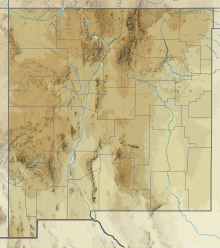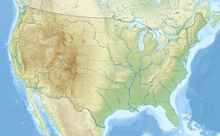Taos Regional Airport
Taos Regional Airport | |||||||||||||||
|---|---|---|---|---|---|---|---|---|---|---|---|---|---|---|---|
| Summary | |||||||||||||||
| Airport type | Public | ||||||||||||||
| Owner | Town of Taos | ||||||||||||||
| Serves | Taos, New Mexico | ||||||||||||||
| Elevation AMSL | 7,095 ft / 2,163 m | ||||||||||||||
| Coordinates | 36°27′29″N 105°40′21″W / 36.45806°N 105.67250°W | ||||||||||||||
| Map | |||||||||||||||
 | |||||||||||||||
| Runways | |||||||||||||||
| |||||||||||||||
| Statistics (2022) | |||||||||||||||
| |||||||||||||||
Taos Regional Airport (IATA: TSM, ICAO: KSKX, FAA LID: SKX) is a public use airport eight nautical miles (15 km) northwest of the central business district of Taos, in Taos County, New Mexico, United States. It is owned by the Town of Taos.[1] FAA's National Plan of Integrated Airport Systems for 2009–2013 classifies it as a general aviation airport.[2]
Although many U.S. airports use the same three-letter location identifier for the FAA and IATA, this airport is assigned SKX by the FAA and TSM by the IATA[3] (which assigned SKX to Saransk Airport in Saransk, Russia).[4]
Facilities
[edit]Taos Regional Airport covers 832 acres (337 ha) at an elevation of 7,095 feet (2,163 m) above mean sea level. It opened in March, 1967 with one runway designated 4/22 with an asphalt surface 5,504 by 75 feet (1,678 x 23 m).[1] On August 25, 2017, a second runway was opened.[5] Designated 13/31, it also has asphalt surface, and is 8,600 by 100 feet (2,621 x 30 m).[6] As of the fall of 2022, a new 8000 square foot terminal building was approved and is planned for construction in the near future.[7]
For the 12-month period ending April 25, 2022, the airport had 7,000 aircraft operations, an average of 134 per week. These operations included 94% general aviation, 3% air taxi, and 3% military. At that time, there were 30 aircraft based at the airport: 22 single-engine, 2 multi-engine 2 helicopter and 4 ultralight.[1]
Airlines and destinations
[edit]Passenger
[edit]| Airlines | Destinations | Refs |
|---|---|---|
| JSX | Dallas–Love, Denver–Rocky Mountain[8] Seasonal: Austin–Executive, Burbank,[9] Las Vegas,[10] San Diego/Carlsbad[9] | [11] |
Historical airline service
[edit]The Taos Regional Airport first opened in March, 1967 as the Taos Municipal Airport. Taos has seen scheduled airline service by several commuter and regional air carriers. The first known carrier was Trans Central Airlines which provided service to Albuquerque during the winter of 1968/1969. The Santa Fe Airline Company provided service in 1973 and 1974 with flights to Santa Fe and Albuquerque. In 1974 and 1975, Mountain Air provided flights to Denver, Santa Fe, and Albuquerque. Zia Airlines from 1975 through 1978 operated flights to Santa Fe and Albuquerque. Mesa Airlines came to Taos from 1987 through 1991 with flights to Albuquerque and seasonal service to Denver using Beechcraft 99, Beechcraft 1300, and Cessna 208 Caravan aircraft. Rio Grande Air, based in Taos, operated flights to Santa Fe, Los Alamos, and Albuquerque from 1999 through 2004 also using Cessna Caravans. Other carriers which briefly operated flights to Albuquerque were: JetAire in 1985, Sierra West in 1987, and Westward in 2005. During the winter ski season of 2000/2001, Ozark Airlines (later changing to Great Plains Airlines) operated twice-weekly flights to Dallas/Ft. Worth using 32-seat Fairchild Dornier 328JETs.[12][clarification needed]
There was no commercial service from 2005 until Taos Air, a new virtual airline operated by the Taos Ski Valley, began winter ski-season service in late 2018 with flights to Austin and Dallas Love Field airport also using Fairchild Dornier 328Jets. During the 2019–2020 ski season, Taos Air expanded with flights to Los Angeles via the Hawthorne Municipal Airport and to San Diego via the McClellan–Palomar Airport. There was no service during the 2020–2021 season due to the COVID-19 pandemic in New Mexico, but service resumed later in 2021 with flights during the summer season. Winter and summer seasonal service has since resumed and the carrier is working to provide year-round service.[13] In June 2022, service to Austin was moved to Austin Executive Airport.[14] In December 2022, Taos Air switched operators to JSX and started using JSX's Embraer 135 and Embraer 145 aircraft.[15] Alongside this change saw Austin service return to Austin-Bergstrom International Airport, Hawthorne was moved to Hollywood Burbank Airport, and McClellan-Palomar was moved to San Diego International Airport. During the 2023/2024 winter ski season, Austin service was be moved back to the Austin Executive Airport and San Diego service was moved back to the McClellan-Palomar airport near Carlsbad, California.[16] In May 2024, the virtual name of Taos Air was discontinued and JSX announced renewed service to Dallas Love Field and a new route to Denver-Rocky Mountain, both beginning in June 2024 for the summer season. The new service to Denver is planned to operate year-round while the Dallas flights will still operate only durung the summer and winter seasons. New service to Las Vegas, Nevada operated through the month of October, 2024.[17] Service to Dallas resumed in early November, 2024 and regular winter service to Austin, Burbank, and Carlsbad/San Diego, California will resume in December, 2024. Service to Denver continues on a year round basis.
Accidents and incidents
[edit]- 1 March 1991: The pilot of a Cessna T210M, registration number N761MU, was killed when the aircraft crashed about 1.5 miles (2.4 km) north of the airport after departing in freezing rain and snow. The accident was attributed to the pilot's decision to take off in icing conditions exceeding the aircraft's ability to continue flight. A contributing factor was inadequate pre-flight deicing.[18]
- 29 March 1992: A Rockwell 690A, registration number N111FL, crashed into rising terrain after taking off at night in low visibility. The pilot and four passengers were seriously injured and one passenger was killed. The accident was attributed to the pilot's failure to maintain the climb, compounded by poor visibility.[19]
- 24 February 2000: A Cessna 182E, registration number N2988Y, crashed during a visual flight rules (VFR) approach at night. The pilot and sole occupant, who reported difficulty seeing the runway due to snowfall, was killed. The accident was attributed to continued VFR into IMC.[20]
- 8 November 2002: An IAI 1124A Westwind, registration number N61RS, crashed during an Instrument Landing System (ILS) approach, killing both pilots. The accident was attributed to "The pilot's inadvertent flight into mountain wave weather conditions while IMC, resulting in a loss of aircraft control."[21]
- 10 July 2013: A Flight Design CTSW, registration number N424CT, flew into sudden extreme turbulence while maneuvering in the airfield traffic pattern; the aircraft dropped, rolled, and crashed, killing one pilot and seriously injuring the other. Investigators determined that the aircraft had flown into a dust devil, resulting in a loss of control.[22]
- 18 June 2015: A Northwing Design Apache Sport ultralight trike, registration number N51311, suddenly "[fell] out of the sky" during a right turn soon after takeoff, crashing and killing the pilot. Investigators were unable to determine a reason for the pilot's apparent loss of aircraft control.[23]
References
[edit]- ^ a b c d FAA Airport Form 5010 for SKX PDF. Federal Aviation Administration. Effective 10 August 2023.
- ^ National Plan of Integrated Airport Systems for 2009–2013: Appendix A: Part 4 (PDF, 1.61 MB) Archived 2011-06-06 at the Wayback Machine. Federal Aviation Administration. Updated 15 October 2008.
- ^ "Taos, New Mexico - Taos Regional (IATA: TSM, ICAO: KSKX, FAA: SKX)". Great Circle Mapper. Retrieved 20 May 2010.
- ^ "Saransk, Russia (IATA: SKX, ICAO: UWPS)". Great Circle Mapper. Retrieved 20 May 2010.
- ^ Moya, Jesse (25 August 2017). "Ribbon cut opens Taos Regional Airport runway". The Taos News. Archived from the original on 12 October 2023.
- ^ "AirNav airport information for KSKX".
- ^ Hooper, Will (28 September 2022). "New airport terminal design approved". The Taos News. Archived from the original on 29 September 2022. Retrieved 4 October 2024.
- ^ "TAOS SKI VALLEY PASSES BATON ON AIR SERVICE". Taos News. 29 May 2024. Retrieved 9 February 2024.
- ^ a b "Airport Receives Millions in State Funds to Lure More JSX Service". AirlineGeeks. 2 October 2024. Retrieved 4 October 2024.
- ^ "JSX 4Q24 Network Additions". Aeroroutes. Retrieved 28 June 2024.
- ^ "Where We Fly". JSX. 15 April 2024. Retrieved 19 April 2024.
- ^ Official Airline Guide
- ^ Official Airline Guide
- ^ Hooper, Will. "Taos Air returns for summer service". The Taos News. Retrieved 21 September 2022.
- ^ "Taos Air - The Easiest Route to The Rockies". Taos Air. Retrieved 28 November 2022.
- ^ "JSX Taos Home Page". JSX. Retrieved 27 November 2022.
- ^ "JSX TAOS NEW MEXICO SUMMER". JSX. Retrieved 29 May 2024.
- ^ "NTSB Aviation Accident Final Report DEN91FA048". National Transportation Safety Board. Retrieved 5 December 2019.
- ^ "NTSB Aviation Accident Final Report FTW92FA099". National Transportation Safety Board. Retrieved 5 December 2019.
- ^ "NTSB Aviation Accident Final Report DEN00FA053". National Transportation Safety Board. Retrieved 5 December 2019.
- ^ "NTSB Aviation Accident Final Report FTW03FA036". National Transportation Safety Board. Retrieved 5 December 2019.
- ^ "NTSB Aviation Accident Final Report CEN13LA409". National Transportation Safety Board. Retrieved 5 December 2019.
- ^ "NTSB Aviation Accident Final Report CEN15FA277". National Transportation Safety Board. Retrieved 5 December 2019.
The witnesses stated that the aircraft seemed to "fall out of the sky.
External links
[edit]- Taos Regional Airport, official Town of Taos page
- Aerial photo as of 5 October 1997 from USGS The National Map
- FAA Terminal Procedures for SKX, effective December 26, 2024
- Resources for this airport:
- FAA airport information for SKX
- AirNav airport information for KSKX
- ASN accident history for TSM
- FlightAware airport information and live flight tracker
- NOAA/NWS weather observations: current, past three days
- SkyVector aeronautical chart, Terminal Procedures


